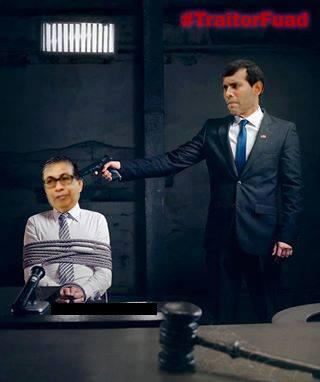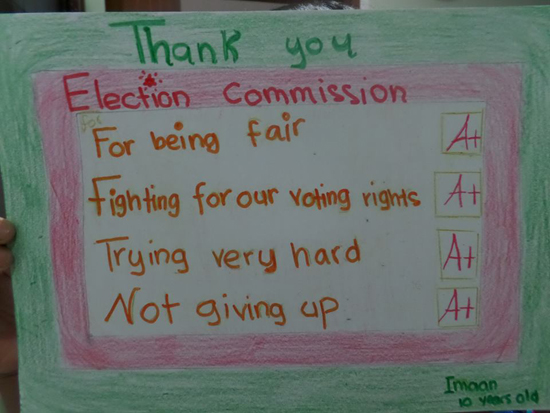Jumhooree Party (JP) presidential candidate, Gasim Ibrahim, called on President Dr Mohamed Waheed to take action against Elections Commission (EC) members for allegedly violating the constitution “even by declaring a state of emergency.”
Speaking during a debate at today’s sitting of parliament, the JP leader contended that EC members had violated the constitution by allegedly “speaking against article 113”, which states that the Supreme Court shall have sole and final jurisdiction to determine all disputes concerning the election of a presidential candidate.
EC members should face criminal prosecution for allegedly divesting the constitution of its power and authority, the MP for Alif Dhaal Maamigili insisted.
Following the presidential election on September 7 in which he came third with 24 percent of the vote, Gasim alleged electoral fraud and contested the results in the Supreme Court, which subsequently annulled the polls on October 7.
The business tycoon went on to call upon President Waheed to “act in accordance with the constitution even by declaring a state of emergency” as failure to do so would see “the nation fall outside the bounds of the constitution.”
Chapter 11 of the constitution empowers the president to declare a state of emergency for 30 days “[i]n the event of natural disaster, dangerous epidemic disease, war, threat to national security, or threatened foreign aggression”.
However, the declaration of the state of emergency must be submitted to the People’s Majlis for approval within 48 hours, after which parliament has the authority to revoke the declaration.
Asked about Gasim’s appeal at a press conference today, President Waheed said the EC faced a number of serious difficulties and that the commission had done a lot of work within a short period.
“I don’t believe this is the time to take legal action against them. There is still room to work together to resolve the issue,” he said.
Debate
Gasim’s remarks came during a debate on an early day motion submitted by the opposition Maldivian Democratic Party (MDP) MP Ali Azim calling on Speaker of Parliament Abdulla Shahid to assume the presidency if a president-elect cannot be sworn in on November 11 as stipulated by the constitution.
The motion without notice – a non-binding motion that opens the floor for a one-hour debate – also called for the immediate resignation of President Waheed, contending that his administration had obstructed the constitutionally mandated presidential election from taking place.
Article 110 states, “Elections for the office of President shall be held within one hundred and twenty days to thirty days prior to the expiry of the existing presidential term.”
Presenting the motion, Azim noted that the constitutional deadline to conclude a presidential election expired on October 10. He argued that amendments to the relevant laws as well as interim arrangements with the Speaker assuming the presidency was necessary to avoid a constitutional void after November 11.
While the Supreme Court judgment annulling the September 7 election stated that the current president could remain in the post after November 11 in the absence of a president-elect, Azim said that the judgment was “unconstitutional.”
“If extra time beyond that given by the constitution is needed, under the principle of necessity, to complete a specific task as specified in the constitution, it does not necessitate the end of a legal government in place. That such a government will continue to exist under the doctrines of ‘state of necessity’ and ‘continuity of legal government’ under such circumstances is recognised by both constitutional and legal jurisprudence,” the Supreme Court stated in the case summary of its judgment.
In the parliamentary debate on the motion today, MDP parliamentary group leader, MP Ibrahim Mohamed Solih, contended that the Maldivian state has lost its democratic status as citizens have been deprived of “one of the most important bases of democracy.”
Constitutional void
Pro-government MPs meanwhile spoke against the MDP’s motion, insisting that the Supreme Court was the highest authority on constitutional matters.
“We have to accept the decisions of the Supreme Court,” MP Riyaz Rasheed said in response to MDP MPs arguing that the EC did not have to abide by the guidelines imposed on it by the Supreme Court judgment.
Independent MP for Kulhudhufushi South, Mohamed ‘Kutti’ Nasheed – legal reform minister under former President Maumoon Abdul Gayoom – argued that the speaker could not assume the presidency after November 11 even if President Waheed resigned.
Nasheed explained that the constitution did not specify a process to be followed in the event that a president is not elected by the end of the five-year presidential term on November 11. The constitution only specified a process for fresh elections if the president or vice president resigned before the end of their terms, he said.
Article 124(b) of the constitution states, “In the event of the permanent incapacity, resignation, removal or death of both the President or the Vice President, and both offices becoming vacant at the same time, leading to an incapacity to carry out the duties of the President, until such time as a President and a Vice President shall be elected, the duties of both offices shall temporarily be carried out, in order of priority, by the Speaker of the People’s Majlis, or by the Deputy Speaker of the People’s Majlis, or by a member of the People’s Majlis elected by a resolution of the People’s Majlis, until successors in office are chosen.”
“However, this constitution does not say what should be done if a president is not elected within the period in which it must be done,” Nasheed said.
If President Waheed resigns after November 11, Nasheed suggested that parliament should amend the constitution to specify a process to be followed in the absence of a president or vice president after the end of their terms.

